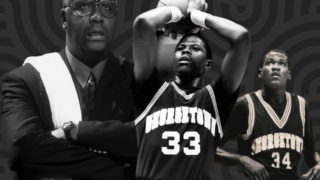The Boston College point-shaving scandal of the 1978-79 college basketball season remains one of the darkest chapters in the history of collegiate sports. The scandal unfolded with a web of corruption that tarnished the integrity of the game and sent shockwaves throughout the basketball community. The incident involved players from the Boston College Eagles, who were implicated in a scheme to manipulate the point spread for betting purposes.
The scandal came to light in the spring of 1981, but its roots could be traced back to the preceding years. In the 1978-79 season, several Boston College players, notably Rick Kuhn, Jim Sweeney, and Ernie Cobb, were entangled in a point-shaving conspiracy orchestrated by mobsters. The players conspired to deliberately perform poorly in certain games, ensuring that the final score would fall within a predetermined point spread. This allowed those involved in the scheme to profit from illicit sports betting.
The orchestrators of the point-shaving scandal had connections to organized crime, highlighting the seedy intersection of sports and illegal gambling. The scandal unfolded with revelations that players were receiving cash bribes to influence the outcomes of games. The scheme cast a shadow over the integrity of college basketball and raised serious questions about the vulnerability of student-athletes to external pressures.
The most infamous incident in the scandal occurred during a game between Boston College and the University of Connecticut on February 18, 1979. Boston College, favored by nine points, won the game 93-79, covering the spread. This raised suspicions, as the victory seemed unusually decisive, and it prompted an investigation that would eventually expose the corruption within the team.
The aftermath of the scandal was swift and severe. Legal proceedings ensued, and the players involved were brought to trial. In 1981, Rick Kuhn, Jim Sweeney, and Paul Mazzei were convicted on charges related to the point-shaving scheme. They faced not only legal consequences but also permanent bans from involvement in collegiate and professional sports.
The scandal had far-reaching implications for Boston College and college basketball as a whole. It prompted a reevaluation of the safeguards in place to protect the integrity of collegiate sports and raised awareness about the vulnerability of student-athletes to external pressures, especially those associated with gambling interests.
In the aftermath of the scandal, the NCAA and other sports organizations implemented more stringent measures to monitor and prevent point-shaving and other forms of corruption. Educational programs and resources were developed to educate athletes about the dangers of gambling-related misconduct and the potential consequences for both themselves and the integrity of the sports they played.
The Boston College point-shaving scandal serves as a cautionary tale about the influence of external forces on college athletes and the importance of maintaining the integrity of sports competitions. It also highlighted the need for ongoing vigilance and education to prevent similar incidents in the future. The scandal remains a stain on the history of college basketball, a stark reminder of the risks associated with the intersection of sports and illicit activities.
In reflecting on the scandal, former Boston College player Jim Sweeney, one of those implicated in the point-shaving scheme, remarked, “It was a moment of weakness that turned into a lifetime of regret. The consequences of our actions went beyond personal ruin; it damaged the reputation of our team, our school, and the game we loved. It’s a cautionary tale for every young athlete to resist the temptations that can compromise the integrity of the sport.”




